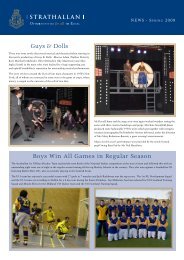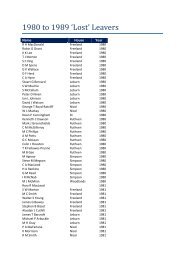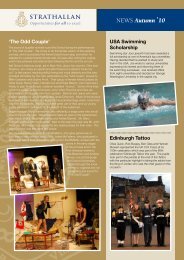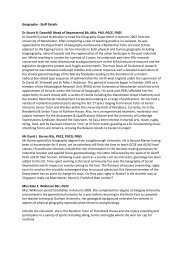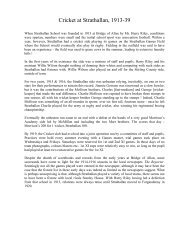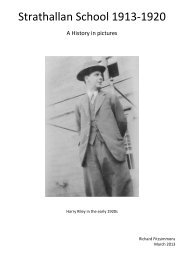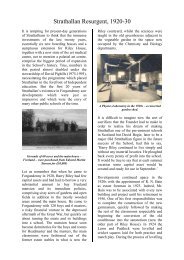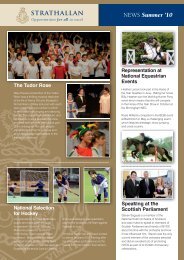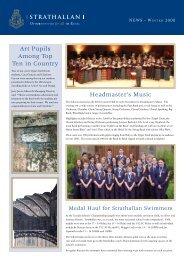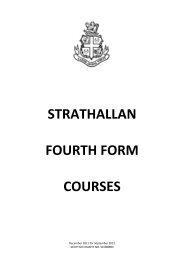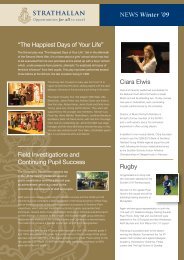Past, Present & Future PDF 377KB - Strathallan School
Past, Present & Future PDF 377KB - Strathallan School
Past, Present & Future PDF 377KB - Strathallan School
- No tags were found...
You also want an ePaper? Increase the reach of your titles
YUMPU automatically turns print PDFs into web optimized ePapers that Google loves.
STRATHALLIAN2003-04Commemoration Day 1932Each summer term was marked by a Sports’ Day, whichhad become one of the accepted times that many formerpupils returned to the school, so the one held on 7th June1927 was more unusual for two things. Firstly, the rainconspired to fall heavily throughout the day for the firsttime in ten years, considerably dampening the spirits ofcompetitors and spectators alike. Secondly, Harry Riley metall those former pupils in attendance at a lunch when theywitnessed the inauguration of the Old Boys’ Club for whichHarry Riley agreed to act as temporary secretary andtreasurer. Allan Robertson, from the Bridge of Allan days,was the first ever enrolled member of the Club. Riley wassoon to be supported by A. W. James, a close friend, whotook the role of General Secretary, and J. B. Morrison whobecame Treasurer. James always accompanied Harry Rileyto the various meetings and dinners, and was ever ready togive an account of the formation and development of theClub. He always insisted that his position was a temporaryappointment, even at the end of 1932 when he resigned toallow an Old Strathallian to take up the post.The Strathallian Magazine that summer contained amembership form to be returned as quickly as possible as‘invitations to the Annual Dinner at ‘Xmas will be issued tomembers only. I expect a good turnout and intend to usethe event to create office bearers. I also intend to make theClub a real live one which will not only facilitateperformance of social functions, but one which will be avery real help to “O. S. ’s” in business and life as a whole’.Harry Riley also intended the Magazine to act in theinterests of Club when he added that he will be pleased toreceive from “O. S. ’s” items of personal interest with a viewto publication. He produced twelve items on Old Boyshimself for the magazine, a feature of the Magazine formany years, as well as highlighting Sam Dow’s Europeanprogress as the Vintner Scholar, a success of which HarryRiley was very proud.It is with great pleasure that we watch the Former Pupilsrallying round their old school by joining the newly formedOld Boys’ Club, which promises to be a really living bond ofunion. We understand that up to the time of going to press106 have enrolled, which, though an excellent beginning, isa comparatively small proportion of eligible members. Wehope that many will make their New Year’s resolutions, andwill see that it is not broken. Thus, Harry Riley began thethird Strathallian Magazine, with the assistance of the neweditors; A. M. Moodie and E. W. Hart. This time theMagazine included the first account of the annual triparound Europe that Harry Riley made with his seniorprefects; and an article on life in Burma written by TomFerguson, a former pupil from the Bridge of Allan days.The latter was the first of many accounts on businessesaround the world run by Old Strathallians, which wereto encompass every continent. Harry Riley provided anexpanded “O. S.” Notes, as part of his plan to record andadvertise the success of former pupils in business,academic and sporting life. He was especially proud ofDan Smith and W. S. Scott who were part of arepresentative Scotland XV in India.The editors were beginning to recognise the enormous partthat the former pupil contributions played in the magazine,and the success that this imparted, but were equally awarethat existing school members were not as involved as theywould have liked. “The Strathallian” is the official organ ofthe <strong>School</strong>: and the whole <strong>School</strong> reads it and enjoys it; andas it represents each member of the community, eachmember should feel it his duty actively to support it andhave a finger in its production. Those boys who wereresponsible for the first number realise that they begansomething of which they may be proud, and are stillcontributors. Is the <strong>School</strong> to stand by and let the numberof F. P. contributors surpass that of the present pupils?
PAST, PRESENT AND FUTURESTRATHALLIAN2003-04Sam Dow, third president elected in 1934.He attended the <strong>School</strong> from 1921 -27 Memberof the first XV and XI for several yearsOf course, as 1927 drew to a close, the crowning event forHarry Riley was the Old Boys’ Dinner. This was held byabout fifty former pupils at the Central Station Hotel,Glasgow, on the 16th December following an informalmeeting of the Club when the proposed rules for the Clubwere confirmed and plans were laid for a future meeting tobe held at Forgandenny on 19th February; the date agreedfor the official opening of the new Simpson House. Thedinner was highlighted by the exchange between TomFerguson, who reminded the assembled company of thespirit encouraged at Bridge of Allan by Jimmy Gowans,David Nicol, Allan Harley and George Mollison. Harry Rileyobserved that Tom had rightly divined the true source of<strong>Strathallan</strong>’s success and that the various generations ofStrathallians had broadened and strengthened thesefoundations until now it could be seen the vital part of theschool was neither bricks nor mortar, neither flesh norblood but spirit. Further exchanges between Gavin Morton,recognised as the founder of the school rugger club, andTommy Hart, the last year’s games captain, neatly pointedout that there existed in the school teams a splendid espritde corps which was really the first essential of a successfulteam. Unfortunately, a bulletin of the evening with aphotograph of the assembly, which we know was circulateddue to a letter received from Hamish McPherson in Alberta,has not survived.Harry Riley must have been delighted at the success of hismove towards the formation of a secure link between the<strong>School</strong> and the former pupils. The practical mechanismsfor the implementation of the scheme were wellconstructed and had withstood the tests. It is nocoincidence that all this occurred at a time when the schoolroll broke 200 for the first time, a <strong>School</strong> song had beenwritten, and a considerable investment had been made innew buildings and substantial new lawns for cricket. Thethree Houses; Nicol, Freeland and Ruthven, were to becomplemented by a fourth to be named Simpson - HarryRiley’s mother’s maiden name. Like the publication of thefirst magazine, the opening of the building was delayed fora while. During this last summer, we have had a recordnumber of Old Boys visiting the school ……this is mostgratifying, as it shows not only an increasing bond offellowship coming into being, but the growing interest ofStrathallians, generally, in the doings of the <strong>School</strong>.George B. Smith, fourth president elected in 1935.He attended the <strong>School</strong> from 1920 -26 Member ofthe 1st XV and XI 1925-26; Captain of <strong>School</strong> 1925-6.80 |OLD STRATHALLIANS
STRATHALLIAN2003-04During the Christmas break a frozen pipe had causeddamage to the ceilings of the new building and theproposed February meeting at Forgandenny of the OldStrathallian Club was postponed and held instead on 11thMarch 1828. Harry Riley was able to mount a tour of someof the new boarding rooms, not all occupied untilSeptember, and the new dining rooms. There were severalproposals made at this, the first formal meeting of the OldBoy’s Club. The blazer came in for some discussion andvery colourful suggestions, although use of the existingversion produced by Rowans was to continue for thepresent. Invitations were to be sent for an Old Boys’Commemoration Day on the last Saturday in June, and thenext Annual Dinner would be in Glasgow on 21st Decemberat a cost of about fifteen shillings a member.Robert Barr, President 1939 and 1st Old StrathallianRepresentative Governor of the <strong>School</strong>. He wasat <strong>School</strong> 1921- 26 Member of the 1st XV and XIfor several years.The Boss had achieved his goal: the establishment of thepast was complete. Harry Riley took the opportunity to savehis beloved Alvis from the exigencies of the annualEuropean Tour with a cruise instead around the NorwegianFjords. It is clear that the presence of the <strong>School</strong> CaptainHamish Kay and the Magazine editors Moodie and Hart onthe cruise would have meant that magazine number threewas discussed in some comfort. The fourth edition, editedby Mr. M. Norton of the English Department with theassistance of Willie Thomson and Leonard Galloway, was amuch more balanced publication which intelligently coveredSports, Scouting and Drama at home along with topics likedairy farming in New Zealand, and included severalhumorous articles. It was noted that Tommy Hart, W. J.Walker and W. H. Reid who all played first-class Scottishcricket over the summer season were worthily upholdingthe tradition of <strong>Strathallan</strong> as a cricketing school. At thesame time, Guthrie Reid, whom some of the best Judges ofRugby Football had openly predicted to receive Internationalhonours in the Scottish side at Murrayfield, was compelledby doctors to give up the game; he continued to give to thesport as the organiser of the Old Boys’ matches.Fourteen former pupils met Harry Riley at an informaldinner in London in April with a view to forming a LondonBranch of the Club, and Glasgow former pupils arranged aspecial game for the <strong>School</strong> on the last day of April againsta Glasgow University XV that boasted four Old Boys and aguest Old Boy from Oxford, and was lost only by threepoints to nineteen. The London representatives invitedHarry Riley to referee a game of rugby between the firms ofSteel Brothers and Balfour Williamson, which teamsinvolved ten Old Strathallians. The expertise of the London“Strath” Club came to the attention of London Scottish,having available some of the best of the <strong>School</strong> fifteensabout four or five years ago. Alan Porter who worked forSteel Bros was playing for ‘Scottish at the time.Many were present, as usual, at the Annual Sports Day onJune 15th 1928. Harry Riley had invited Lady Grant ofMonymusk, a former occupant of Freeland and one of thedaughters of the previous owner, Collingwood Lindsay Wood,to present the prizes. One of the new prizes was a silver cupgiven by Mr and Mrs Dow for the champion House at rugby;first winner was Freeland. A second cup given by the Dowsfor Cricket went to Nicol, presented at the end of the seasonby Harry Riley on July 10th. Other dates were established onthe calendar. Interest was kindled in a grand tennistournament which culminated in semi-finals and finals onJuly the 5th and 6th, and a swimming championship washeld on Monday July 9th in the swimming pool only madeavailable some four days earlier: little regret was expressedthat the annual dip in the River Earn was a thing of the past.Harry Riley officially opened the pool on the evening ofFriday 26th October. This meant that on the occasion of theOld Boy’s Annual Rugby match held on 1st December therewas also a swimming relay competition between the <strong>School</strong>and former pupils; victory to the latter through theformidable efforts of George Smith, A. Moodie, and AlanLambie, hot from the Rugby field.
PAST, PRESENT AND FUTURESTRATHALLIAN2003-04Simpson HouseThe second Annual Dinner was held on Friday 21stDecember 1828 in Glasgow. The majority of members werestill in favour of the venue but the selection of a futurevenue was the subject of diverse opinions, so much so thata Dinner Committee was established with Sam Dow andGuthrie Reid to look at the situation seriously, while TommyHart and J. B. Morrison were appointed to act with HarryRiley in drawing up rules and regulations regarding theformation of Branch Clubs at home and abroad. Themembership had increased from one hundred and five toone hundred and forty four over the year, and there werefourteen life members on the roll. The Committeeannounced that they would like very much to have at leastfifty Life Members by the end of this year, and the parentsof boys who are about to leave have been approached with aview to their making their sons a present of lifemembership. Harry Riley felt that experience shows thatwhere joining the Club is left to the boy himself he oftendelays so long that he loses touch with his old school andschool friends.Eighteen London Strathallians led by James Motion heldtheir first annual dinner at the Kenilworth Hotel,Bloomsbury, with Harry Riley as their chairman. Riley gavethe members a detailed account of the progress made bythe Club since its inception, adding that he regretted thatthere had been some difficulty in tracing some of themembers who are known to be resident in London. He knewat this time that there were plans for Branch Clubs atDundee and Edinburgh through George Smith and JardineStuart respectively. Riley had intended to keep the Clubtogether as one body but now found a serious divergencedue to location, which he was trying to negotiate in the bestway. In the end he gave his approval to members to linkthemselves up with the parent body through their LocalBranches. One of the first ‘collective’ issues of the newbranches was to decide on the final form of the OldStrathallian Blazer – plain or striped? The latter wasselected by a majority of only three votes, and Guthrie Reidled a ‘blazer committee’ to decide on the final coloursOn 3rd February 1929, the Dinner Committee met atForgandenny. The sundry expenses of the Dinner had alwaysbeen met by Harry Riley, but the committee wanted a moreformal arrangement and were aware of the costs tomembers. They decided to hold the Dinner on Saturday 1stDecember with the interests of Old Strathallians living at adistance from Glasgow at heart. D. Oliver Melrose,<strong>Strathallan</strong>’s most successful goal kicker ever, personallyoffered such members to arrange to stay with oldStrathallians in Glasgow for the night of the Dinner. Asecond innovation was the intention to invite a guest ofhonour to be present at the Dinner and bearing in mind thathe is sure to tell us a good deal about ourselves, we trustwe shall be proud of seeing ourselves as others see us.News was received of an impending dinner to be held inRangoon from Alan Porter who stated that there are manyStrathallians in this district now, and we suggest that theyshould get together and have a Strath. Dinner and send anaccount of it for the Magazine. There was also a ‘Strath’Colony settling down under the wing of Clydesdale CricketClub with five Old Strathallians in regular attendance, one ofwhom, Tommy Hart, had already arranged a <strong>School</strong> versusGlasgow ‘Varsity XV match at the end of the 1928 season.The Dundee Strathallians’ Dinner held at Kidd’s Restaurantin early February was a proven success with a good turnoutthrough the work of George Smith, the Dundee LocalSecretary. This was despite the serious Influenza outbreakthat wrecked similar plans by the Edinburgh Strathallians:their first dinner was not to be until Saturday 7th Decemberat the North British Hotel. Harry Riley attended in Dundeeyet again as the honoured chairman and was accompaniedby Mr. M. Norton, the editor of the Strathallian. There werealso a large number of unofficial dinners due to the ‘comingof age’ of several Club members throughout the year, thelargest gathering of which was for Sam Dow and required asubstantial Glasgow ballroom.82 |OLD STRATHALLIANS
STRATHALLIAN2003-04The first Commemoration Day fell on Saturday 29th June1929 as planned but the date of Sports’ Day was changed tobecome the day before. This year, no invitations were sentas they know that they will be heartily welcomed and themore of them there are present on these occasions themore pleased we shall be. As might have been expected,fewer former pupils than usual attended Sports’ Day forwhich the prize giver was Mrs Murray of Taymount, thesister of the previous year’s guest. Commemoration Daybegan with a chapel service at three o’clock in the afternoonfor about thirty members and the Senior <strong>School</strong>; anothertwenty former pupils arrived later. Harry Riley specificallyselected the hymns “Fight the Good Fight”, and “We Lovethe Place” and gave one of his expected addresses,emphasising the ideals of the school and the greatness ofits spirit. On such a day with present upholders of that spiritmingling with those of the past, all might benefit;particularly those who had left, and in the whirl of businesslost some of that idealism, are afforded an opportunity ofrecapturing their schoolboy fervour and public spiritednessand can go back to their work with a new faith and arenewed strength. The service was followed by the annualtwelve-a-side cricket match between the <strong>School</strong> and the OldBoys; the latter fielding nine first team blazers. Thisstrength proved not to be enough when the <strong>School</strong>, probablyinvigorated by the close contest with H. B. Rowan’s XI onlythe previous Wednesday, came out victors as they passedthe Old Boys total with 131 for eight wickets. In the eveningwas held the second ever Swimming Relay Race.The magazine was to lose Thomson and Galloway after twoyears service as editors; both heading for ScottishUniversities like many of their fellows. They were replacedby D. Walker and J. T. Johnston, a tricky scrum-half andgood opening bat. The undoubted success of Strathalliansat many Universities made the annual reunions doublyimportant. Old Strathallian Dinners were to be held now inGlasgow, Dundee, Edinburgh and London; this last tocoincide with the England – Scotland International atTwickenham and expecting a large Strathallian attendance.Foremost amongst the representative honours was TommyHart who secured <strong>Strathallan</strong>’s first International cap atMurrayfield, with the support of the 1st, 2nd and 3rd <strong>School</strong>XVs and a very large contingent of Old Boys. Dan Smith hadbeen selected some three years earlier but had beenunable to take his part, and the next would be TubbyRitchie, on the bench for the French game in 1830 butplayed against England the following season; and RonnieDunn, a trialist in 1931. Such was the wealth of expertiseamongst the Old Boys that Guthrie Reid became convenorof a new committee with Robert Barr formed to take chargeof future Old Boys matches against the <strong>School</strong> .The third Annual Dinner was held as planned on 21stDecember 1929 at the Grosvenor Restaurant and a largegathering from the now 179 members, includingrepresentatives from each Local Branch, was present tohear an address from the guest Lieutenant Colonel A. D.MacInnes Shaw, D. S. O. If your school can combineeducation, and first class commercial education at that,with the esprit de corps I see tonight, your school is secondto none. But there is even more than that; one makes atschool friends, and these friendships are greater than anyother friendship that we can form throughout life. HarryRiley could not have wished for a more complimentaryendorsement of the course of action that he had startedjust two years previously through the Magazine. Furtherspeeches that night showed the affection felt for him by theOld Boys. James Dow emphasised with more than a littleself-deprecation the schemes and enormous expenditureon the <strong>School</strong> which would not, I am sure, have beenauthorised by any Board of Governors. One story told ofHarry Riley was of the time he met a U. S. Senator and hiswife on a train journey on the Riviera. The American, agreat traveller, spoke of places all over the world, to whichRiley replied almost every time: “Oh, yes, one of my boys isthere!” The American’s wife turned eventually to Riley andsaid in a mystified voice, “Say! You’ve got a boy in Shanghai,another in Chile, several in America and many in London.Gee! You must have an enormous family.” Harry Riley’sprotestations that he was but a bachelor only served tocomplicate matters further.The Boss had achieved his goal: the bridge between pastand present was complete.He confided to the assembled company just how much workhe had done unnoticed on their behalf. We are now in closetouch with business concerns all over Britain who are veryanxious to take our boys who earn the school’srecommendation and train them eventually for executiveposts. Now this part of school life takes up a lot of my time,since I visit not only the boys in these firms, but also theirdirectors who keep me posted not only with the progressthat the boys are making, but with their own exactrequirements. There is a tremendous advantage in this tothe boys, to the <strong>School</strong>, to business and the country. Headded significantly, in explanation of the bond he continuedto form with his senior boys, I have drawn my prefectsmuch closer to me than ever they were in the history of theschool – and I have done this on the advice of some of youhere tonight. We had the first of a series of prefects’dinners this last term, where after the usual formal toasts,we had quite a useful exchange of views, and I wasdelighted to find that they were able not only to make usefuland constructive suggestions, but they showed an increasedkeenness to do anything in their power to further theinterests of the <strong>School</strong>.
PAST, PRESENT AND FUTURESTRATHALLIAN2003-04John B Maitland Cowan, first permanent Secretary and Treasurer of the Old StrathallianClub, elected in December 1933. He attended the <strong>School</strong> from 1922 -25; one of the firstformer pupils to attend Glasgow University and one of the most successful lawyers everfrom the school. Harry Riley came to rely on his friendship and advice, and he continuedto serve the school for many years following H. R. ‘s death.The contacts that Harry Riley had made over the years, andthe numbers of former pupils in successful businesses as aresult, now led to an extraordinary Rugby Game held atForgandenny on March 12th 1930. The previous December,the Old Boys Rugby XV had managed their first victoryagainst the school for some years, due to the preparation ofGuthrie Reid and Robert Barr. Now, nine Strathallians, ofwhom all worked for the India Tyre and Rubber Company ofInchinnan, brought several of their colleagues for a RugbyGame against the <strong>School</strong>. The <strong>School</strong>, however, reverted totype as on many of these occasions, and, captained by T. F.F. Docherty, made up for the earlier lapse by soundlybeating their challengers India of Inchinnan. Revenge wasachieved by the latter a year later against an unbeaten<strong>School</strong> XV captained by George Moncur, said to be the mostelusive attacking centre and defensive tackler ever.A. M. Melville, the President of the India Tyre and RubberCompany was, however, more partial to cricket, and waspresent when an India of Inchinnan XI played the <strong>School</strong> XIon 24th May. India lost for the removal of only three<strong>Strathallan</strong> wickets and the demands on the <strong>School</strong> ofsome fourteen runs in the last over to win. However he wasalso the guest of honour at Sports Day on May 28th whenhe officially opened the new Cricket Pavilion. In front of alarge company of Old Strathallians and parents, he paidtribute to Mr. Riley’s work and to the type of boy the <strong>School</strong>was sending out into the world. He also made a personalpresentation of the Melville Cup to be awarded each year tothe winning house at Cricket; the first being Freeland in1930. This was the last year when Old Boys versus <strong>School</strong>events would be held on Sports’ Day. Henceforth, they -running and tug-of-war -would be held on CommemorationDay with the cricket, swimming relays and water polo. Atennis match was introduced the following year, and golf onthe Glenfarg course a year later.Professor J. Steggall of St. Andrews presented the Sports’Day Prizes. Professor Steggall was an old friend of HarryRiley, and a representative of the academic contacts thatHarry Riley had made and maintained over the years. Thetwo men had first met when Professor Steggalladministered the first examinations at Bridge of Allan. Hehad performed this function for Harry Riley ever since, andhad overseen the growing number of University scholarshipexaminations. Harry Riley was never to forget thecontributions and support made in this area and, althoughfirmly dependent on his Old Strathallians, later insisted ona wide academic representation in any future Board ofGovernors. Professor Steggall was also the guest of honourat the Dundee Local Branch Dinner held on 6th December.In proposing the toast of ‘The <strong>School</strong>’, the professor agreedto what extent the <strong>School</strong> occupied a warm corner of hisheart, and emphasised how much the <strong>School</strong> owed itsposition and success to the driving force of Mr. Riley, whosename I couple with that of the toast as being inseparable.Riley replied that without the spirit shown by the Old Boysduring their schooldays, I would never have dared to putinto practice the aspirations which are my share in the<strong>School</strong>’s growth.Harry Riley was very happy with the huge turnout onSaturday 28th June for the second Commemoration Day,with at least doubled numbers of Club Members inattendance, although he did wonder where the next servicewould be held if numbers continued to increase at thepresent rate. He then summarised his position for the OldStrathallian Club at the Annual Dinner on the evening ofSaturday 20th December 1830, exactly four years after hehad published that first address in the StrathallianMagazine.When I speak of the <strong>School</strong> I mean the whole corporatebody, not only at Forgandenny, but in a larger and greaterdegree in the outer world. ………At <strong>School</strong>, those of you whohave paid us a visit within the last three months cannot butrealise the very great improvements that have been madesince we last met here.N. Guthrie Reid, second president elected in December 1933 He attended the school from1923-26; member of 1st XV 1924- 26 and was Captain 1st XI 1926 that defeated the famousH. B. Rowans XI. He was advised to give up Rugby while full-back at Glasgow Academicalsand his understudy was selected to play for Scotland84 |OLD STRATHALLIANS
STRATHALLIAN2003-04In sport, the Strathallian records speak for themselves, andthey have spoken so loudly that they have awakened thatsomnolent body, the Executive of the Scottish Rugby Union,to a realisation that we are to get our full quota ofinternational tickets a year.At the Universities, we are gaining honours degrees. Thereare some present here tonight who have been guilty of theold Scottish offence of raiding across the border, and the‘traditional enemy’ is being relieved of several hundredpounds per annum, won in the face of the keenestcompetition in the world.In business life, great international companies, such asShell Oil, Rand Mines, Hudson Bay, have Strathallians ontheir staff and they invite invitations from others.In the Civil Service, the Secretary of State for the Colonieshas now included us in the list of public schools to besolicited from entrants to the higher branches, and I maysay that we have at least ten or twelve boys who are servingin responsible positions in our Crown Colonies. I tell you itis a very significant sign of the times that Old Boys’organisations of Scottish public schools have quite recentlyinvited us to co-operate with them in the formation of aJoint Club in those parts of the world where individualclubs are impracticable.Thus, Gentlemen, at last we are gaining that recognition forwhich we have long striven, and I believe the future holds instore for us even greater things and I appeal to you to stand‘four square’ by your fellows so that we might show aunited front, and to fight your own battle in life in the way inwhich I have seen you fight on the playing fields at<strong>Strathallan</strong>.The Boss had achieved his goal: the past and present werelinked irrevocably with the future.D. Oliver Melrose, first president elected inDecember 1932 in place of Harry Riley. Heattended the school from 1920 -24, and was amember of the Rugby 1st VX 1922 -24; Cricket 1stXI 1924, and Captain of Nicol House 1924. HarryRiley’s close friend A. W. James resigned also in1932 after five years as General Secretary to bereplaced by Stephen BrandGRMRCricket 1st XV 1930




